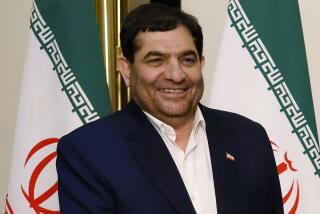Iraqi Vice President Adel Abdul Mehdi quits
- Share via
Reporting from Baghdad — One of Iraq’s three vice presidents has quit the post, his political party said Monday, amid growing public frustration with the government’s performance nearly six months after most of its ministers were sworn in.
Vice President Adel Abdul Mehdi’s decision was meant to set an example for the rest of the government, which has been bloated with state ministries and the expansion this year of the vice presidency from two to three positions, his Islamic Supreme Council of Iraq party said.
“I hope this will start a push to slim down the government,” party chief Ammar Hakim said on the group’s website. The party described the move as “a reaction to the popular will.”
The government had not formally accepted his decision as of late Monday.
Iraq’s senior Shiite Muslim religious figure, Grand Ayatollah Ali Sistani, in February called on politicians to cut their lucrative perks and improve the delivery of basic services to the public. But since then, the government has shown little progress in that regard. Officials are anticipating a long, hot summer, with power outages, unemployment hovering in the double digits, and bombings and assassinations continuing to be part of the fabric of daily life.
The government has fractured along party lines, with Prime Minister Nouri Maliki and his chief rival, Iyad Allawi, trading insults this month. The rift has left Iraq without security ministers despite near-daily violence in the capital. Hopes of creating a broader consultative body for leaders to decide strategic issues have also withered.
Mehdi’s decision to forgo his post suggests an awareness within the political class of its failure to produce real gains for the public.
The vice presidency had been a two-member body, with a Shiite and Sunni representative. However, as parties haggled for posts in the negotiations to form the current government, a third vice president position was created.
The post went to Khudair Khuzai, a senior member of Islamic Dawa-Iraq, a powerful Shiite offshoot of Maliki’s Islamic Dawa Party. Detractors point to it as one more example of the government serving its own interests and not those of the public.
Mehdi had offered his resignation in March to President Jalal Talabani, who refused it and promised to reform the presidency, which includes the vice presidents. But Mehdi, a former finance minister and perennial candidate for prime minister, had evidently been discouraged by the government’s conduct.
“He has been upset with the process. He wasn’t happy all along,” said an official who knows Mehdi and requested anonymity because he was not authorized to discuss the topic. “He has a lot of reservations with how the political process is moving forward.”
Mehdi had emerged as a dark horse candidate last fall to replace Maliki as prime minister, but his candidacy depended on an alliance with Allawi’s secular and predominantly Sunni Iraqiya list. Maliki moved aggressively and gathered the necessary parliamentary votes to secure a second term.
Mehdi’s reputation was tarnished by a bank robbery in the fall of 2009 that involved members of his security team. However, he had proved himself adept at cultivating Washington and had served as finance minister before becoming vice president in 2005.
Other politicians said Mehdi’s departure would resonate with the public but that the government would lose the best of its three vice presidents.
“The people and the senior clergy said frankly there is no need for three vice presidents, so, if Mr. Adel Abdul Mehdi resigned, that will have a positive effect on the street,” said Manal Finjan, a Shiite politician. “On the other hand, I want to say that Mr. Adel Abdul Mehdi himself was the most acceptable of the vice presidents.”
Jaff is a Times staff writer.
More to Read
Sign up for Essential California
The most important California stories and recommendations in your inbox every morning.
You may occasionally receive promotional content from the Los Angeles Times.










